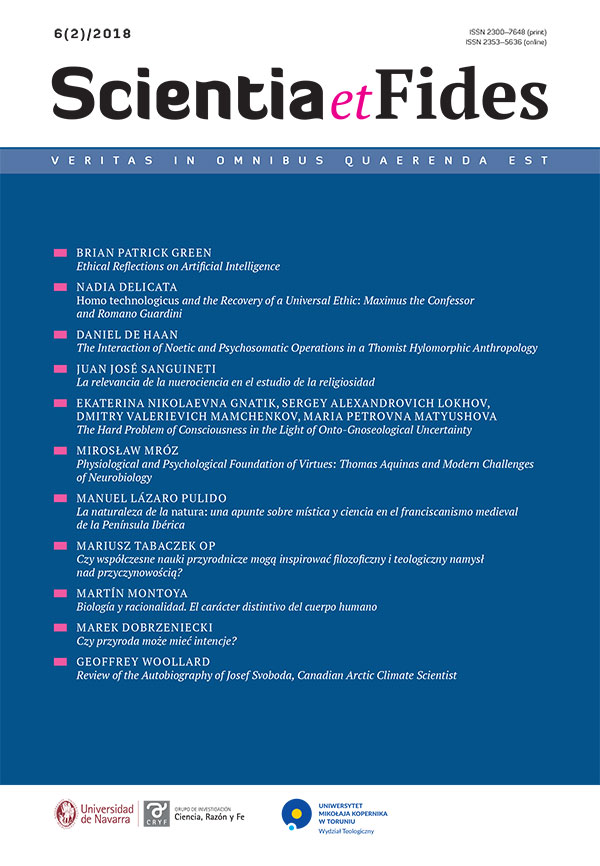La relevancia de la nuerociencia en el estudio de la religiosidad
Keywords
Brain, God, Religion, ReligiosityAbstract
The Importance of Neuroscience in the Study of Religiosity
The article aims to determine whether neuroscience is relevant for a better comprehension of religious activities. The answer to this problem emphasizes the distinction between mental operations and their intentional content. Neurobiological studies, I argue, can be important to evaluate the psychological and neural dimension of religious acts, with caution due to their great complexity, but not to evaluate the truth and genuineness of their content, neither to solve objective religious problems. Neuroscience may be helpful for the discernment of some extraordinary religious experiences and to study pseudo-religious pathologies as well.
References
Ashbrook, James B. 1984. “Neurotheology. The working brain and the work of theology.” Zygon 19 (3): 331–350. DOI: https://doi.org/10.1111/j.1467-9744.1984.tb00934.x
Azari Nina, et al. 2005. “Religious experience and emotion: evidence for distinctive cognitive neural patterns.” International Journal for Psychology of Religion 15 (4): 263–281. DOI: 10.1207/s15327582ijpr1504_1
Beauregard, Mario, and Vincent Paquette. 2006. “Neural correlates of a mystical experience in Carmelite nuns.” Neuroscience Letters 405: 186–190.
Beauregard, Mario, and Denyse O’Leary. 2007. The Spiritual Brain. New York: Harper One.
Beauregard, Mario, and Vincent Paquette. 2008. “EEG activity in Carmelite nuns during a mystical experience.” Neuroscience Letters 444: 1–4.
Beauregard, Mario. 2012. Brain Wars. New York: HarperOne.
D’Aquili, Eugene, and Andrew Newberg. 1999. The Mystical Mind. Minneapolis: Augsburg Fortress Press.
Gaitán, Leandro. 2017. “Neuroteología.” In Diccionario Interdisciplinar Austral, edited by Claudia Vanney, Ignacio Silva, and Juan F. Franck. http://dia.austral.edu.ar/Neuroteología.
Giménez-Amaya, José Manuel. 2010. “¿Dios en el cerebro? La experiencia religiosa desde la neurociencia.” Scripta Theologica 42: 435–449.
Harris, Sam et al. 2009. “The neural correlates of religious and nonreligious belief.” PLOS ONE 4 (10). DOI: 10.1371/journal.pone.0007272.
Husserl, Edmund. 1967. Investigaciones lógicas, vol. 1. Madrid: Revista de Occidente.
Juan de la Cruz, San. 1982. Obras completas, 11ª ed. Madrid: BAC.
McNamara, Patrick (ed.). 2006. Where God and Science Meet, vol. 2: The Neurology of Religious Experience. Londres: Praeger.
Morales, José. 2003. El valor distinto de las religiones. Madrid: Rialp.
Muntané, Amadeo, and M. Luisa Moro, Enrique Moros. 2008. El cerebro, lo neurológico y lo trascendental. Pamplona: Eunsa.
Newberg, Andrew, and Eugene D’Aquili, Vince Rause. 2001. Why God Won’t Go Away. New York: Ballantine Books.
Newberg, Andrew, and Mark Robert Waldman. 2010. How God Changes Your Brain. New York: Ballantine Books.
Newberg, Andrew. 2010. Principles of Neurotheology. Farnham: Ashgate.
Ogata, Akira, and Taihei Miyakawa. 1998. “Religious experiences in epileptic patients with a focus on ictus-related episodes.” Psychiatry Clinical Neuroscience 52: 321–325.
Plessner, Helmuth. 2007. La risa y el llanto. Madrid: Trotta.
Ramachandran, V. S., and Sandra Blakeslee. 1999. Phantoms in the Brain. New York: Quill.
Rubia, Francisco J. 2009. La conexión divina. La experiencia mística y la neurobiología. Barcelona: Crítica.
Sanguineti, Juan José. 2007. Filosofía de la mente. Madrid: Palabra.
Sanguineti, Juan José. 2014. Neurociencia y filosofía del hombre. Madrid: Palabra.
Teresa de Jesús, Santa. 1982. Obras completas, 7ª ed. Madrid: BAC.
Tomás de Aquino. 1988. Summa Theologiae, ed. Paulinae. Milán: Cinisello Balsamo.
Spezio, Michael L. 2001. “Engaging d’Aquili and Newberg’s The Mystical Mind.” Zygon 36: 477–506.
Vrticka, Pascal, et al. 2013. “The neural basis of humour processing.” Nature Reviews Neuroscience, octubre, publicado online, file:///Users/sanguineti/Downloads/Vrticka_Black_Reiss_NRN_2013.pdf.
Wild, Barbara., et al. 2003. “Neural correlates of laughter and humour.” Brain 126: 2121–2138.
Downloads
Published
How to Cite
Issue
Section
License
CC BY ND 4.0. The Creator/Contributor is the Licensor, who grants the Licensee a non-exclusive license to use the Work on the fields indicated in the License Agreement.
- The Licensor grants the Licensee a non-exclusive license to use the Work/related rights item specified in § 1 within the following fields: a) recording of Work/related rights item; b) reproduction (multiplication) of Work/related rights item in print and digital technology (e-book, audiobook); c) placing the copies of the multiplied Work/related rights item on the market; d) entering the Work/related rights item to computer memory; e) distribution of the work in electronic version in the open access form on the basis of Creative Commons license (CC BY-ND 3.0) via the digital platform of the Nicolaus Copernicus University Press and file repository of the Nicolaus Copernicus University.
- Usage of the recorded Work by the Licensee within the above fields is not restricted by time, numbers or territory.
- The Licensor grants the license for the Work/related rights item to the Licensee free of charge and for an unspecified period of time.
FULL TEXT License Agreement
Stats
Number of views and downloads: 907
Number of citations: 1



